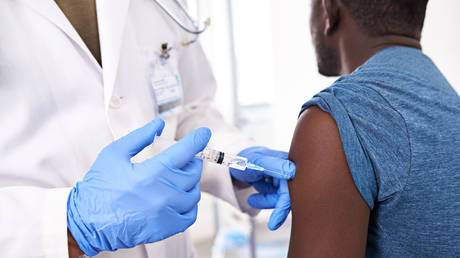
A new poll has revealed that minorities in the UK are significantly less likely to take a Covid-19 vaccine. Authorities blame racially targeted misinformation, but a similar pattern is emerging in the US.
After approving Pfizer’s Covid-19 vaccine earlier this month, Britain got its mass vaccination program underway, aiming to administer 800,000 doses by the end of the year. However, large swathes of the public remain skeptical of the experimental jab, particularly Britain’s ethnic minorities.
A poll published by the Royal Society for Public Health (RSPH) on Wednesday found that 79 percent of white Britons would take the shot on the advice of their doctor, compared to 57 percent “from BAME backgrounds” (Black, Asian and Minority Ethnic). Asians, which in the case of the UK generally means people of Pakistani or Indian descent, were the least likely to say yes to the vaccine, with just 55 percent expressing confidence in it.
The poll also found that lower income groups were less likely (70 percent) to take the vaccine than higher earners (84 percent).
Speaking to the BBC, RSPH Chief Executive Christina Marriott blamed the skepticism on misinformation. “Anti-vaccination messages have been specifically targeted” at these minorities, she told the broadcaster. Junior Minister Nadhim Zahawi, who is in charge of vaccine deployment, added that “people send WhatsApps, videos, all kinds of messages – if you don’t know where that’s coming from then it is very likely to be inaccurate.”
The British government has been fighting an information war of sorts to convince its citizens to take the jab. An army psychological warfare unit and signals intelligence agents have even been drafted in to seek out and counter “online propaganda against vaccines.” However, it is unclear what kind of action these soldiers and spies are actually taking online.
The two biggest political parties are united in their desire to snuff out anti-vaxx content online, with Labour Leader Keir Starmer pressing Conservative Prime Minister Boris Johnson earlier this month to clamp down on “dangerous, frankly life-threatening misinformation” on vaccines, demanding fines for companies that spread such information.
Yet skepticism remains, from the usual online conspiracy theorists and from many alarmed by the vaccine’s rapid development and use of mRNA technology, never before deployed in a vaccine.
The skepticism is not just a British phenomenon. In the US, a Pew Research poll this month found that four in ten Americans would “probably” or “definitely” not take the jab. Like in the UK, confidence in the vaccine is split along racial lines, with 61 percent of whites saying they’d get vaccinated, compared to 42 percent of blacks.
The battle to change minds has been fought primarily by the US’ tech giants, with Facebook and YouTube among the companies outright banning vaccine-skeptic content from their platforms, and Twitter promoting pro-vaccine content from government sources. At a government level, the ever-present Dr. Anthony Fauci has spoken of the need to “get people to take the vaccine,” or face lockdowns beyond next summer.
Yet African Americans are not as enthusiastic as their white counterparts. A report from Chicago last month revealed the difficulty of convincing them to take part in clinical trials and volunteer for vaccination.
“We’ve been hoodwinked so many times with vaccines,” a black pastor from the city’s southside told the Chicago Sun-Times. “We’ve been experimented on by the government, by the scientific community and the hospitals.”
The pastor’s claims aren’t unfounded. African Americans were subjected to horrible treatment by white doctors during the age of slavery, and even after emancipation were used as guinea pigs, most infamously in the ‘Tuskegee Experiment’, in which hundreds of black men were left to suffer and die of syphilis between the 1930s and 1970s, under the illusion they were being treated.
“We know that lack of trust is a major cause for reluctance, especially in communities of color,” Surgeon General Jerome Adams said at a press conference on Monday, hours after nurse Sandra Lindsay, a black woman, became the first person in the country to take the jab. Lindsay’s vaccination was live-streamed and heavily publicized, and former President Barack Obama has also volunteered to take the shot on camera to help promote its rollout.
Think your friends would be interested? Share this story!




